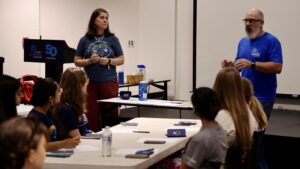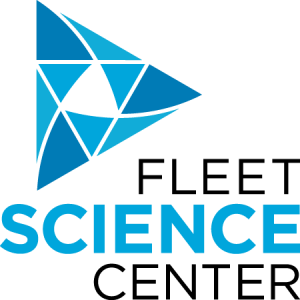Fleet Science Center Materials Matters

UC San Diego MRSEC & Fleet Science Center: Advancing Science Engagement
Our partnership with the Fleet Science Center—San Diego’s premier informal science education organization—enhances MRSEC’s mission to engage multigenerational audiences in the excitement of materials research. With over 461,000 visitors annually and strong connections to local schools and communities, including those serving socioeconomically disadvantaged youth, the Fleet is a strategic partner in broadening access to STEM.
Through this collaboration, MRSEC researchers have gained valuable science communication skills and contributed to a variety of impactful programs:
- BE WiSE – A STEM identity-building initiative that connects female and female-identifying students with MRSEC labs and role models. Expanding this, the BE WiSE Co-Creation process will bring students and researchers together to develop interactive, teen-friendly activities.
- Teacher-Scientist Roundtable – Middle and high school teachers engage with MRSEC researchers to explore real-world applications of materials science and engineering. The program will soon extend to pre-service teachers, incorporating hands-on industry partnerships into lesson planning.
- Science Communication Training – All MRSEC trainees and faculty participate in the Fleet’s inquiry-based training, preparing them to effectively engage broader audiences. Future expansion will include skills tailored to interdepartmental and conference communication.
- Genius in the House – Researchers practice science communication by leading hands-on activities with museum visitors, emphasizing inquiry and playfulness in engagement.
- SciTech – An after-school mentorship program where MRSEC researchers inspire young female students from Title I schools through hands-on STEM activities.
- Sharp Minds – MRSEC faculty present lectures on their research and its societal impact to an audience of adults aged 65 and older.
- Suds & Science – A casual, PowerPoint-free discussion series where faculty share their research at local bars and breweries, fostering engaging, audience-driven conversations.
- Two Scientists Walk Into a Bar – An informal, interactive program where MRSEC scientists surprise the public with the opportunity to ask science-related questions over a drink—no talks, just great conversations.
Together, MRSEC and the Fleet Science Center are making materials science and engineering more accessible, engaging, and impactful for learners of all ages. As we expand these initiatives, we remain committed to fostering curiosity and real-world connections in STEM education and research.
For additional and up-to-date information on all Fleet Center events, please visit https://www.fleetscience.org/events

